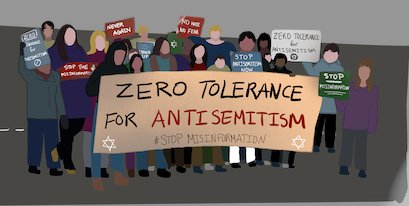The dark past and looming present of antisemitism

Graphic illustrations by Qianzi Loo
Social media has been set aflame with controversy over disparaging antisemitic comments made by rapper Ye and basketball player Kyrie Irving. In today’s society, antisemitism manifests itself in the perpetuation of misinformation through malicious remarks by public figures on social media.
December 12, 2022
Social media has been set aflame with controversy over disparaging antisemitic comments made by rapper Ye and basketball player Kyrie Irving. Termed “antisemitism” by Wilhelm Marr in 1879, hostility and prejudice against Jewish peoples have existed since biblical times. In today’s society, antisemitism manifests itself in the perpetuation of misinformation through malicious remarks by public figures on social media.
Ye, born Kanye West, has been recently voicing a slew of antisemitic comments on Twitter. On Oct. 9, Ye’s Twitter was blocked following his tweet “death con 3 on Jewish people.” This antisemitic statement sparked public outrage, and in response to the comments, Ye clarified that his remarks were in regard to Jewish record labels that he defined as the “Jewish underground media mafia” and their alleged control of the entertainment industry. On Dec. 1, Ye went on to explicitly admit his admiration of Hitler and the Nazis in a podcast interview.
“In the case of Kanye, there might be an element of mental illness, but that does not excuse it,” said Maurice Samuels, Director of the Yale Program for the Study of Antisemitism. “It’s especially dangerous because he seems to have liberated a taboo against the expression of those antisemitic thoughts.”
On Oct. 27, Brooklyn Nets basketball player Kyrie Irving promoted the film “Hebrews to Negroes: Wake Up Black America” on social media. The film contains heavy antisemitic tropes including the denial of the Holocaust and a conspiracy about an international Jewish organization that controlled the world. Immediate public backlash ensued, yet Irving continued to support the film’s controversial messages.
“For me personally, hearing comments like that about your group is especially shocking and makes your stomach turn a little bit,” school counselor Shana Howden said. “We all need to speak out against all forms of it, because words do matter and what people say matters.”
Historically, antisemitism was largely backed by social Darwinism, which outlined theories of racial inferiority. During the Holocaust, Hitler used false prejudices to shape the Jewish population into a scapegoat for Germany’s losses in World War I. Following the Holocaust and defeat of the Nazis, the expression of antisemitism was markedly inhibited. However, in recent years, the world has seen a surge of accusations of Jews trying to control the world, a common antisemitic notion.
“A lot of the contemporary tropes and claims of antisemitism have medieval roots, and are so deeply entrenched,” said John M. Efron, Koret Chair of Jewish History at UC Berkeley. “Not all but many of these accusations have been modified over time but in essence have remained basically the same.”
The rise of modern-day antisemitism has largely stemmed from the rise of nationalism and political polarization, the spread of misinformation about Jews and the tension between the Christians and Jews of America. In 2017, a group of Christian nationalists protesting the removal of the Robert E. Lee statue in Virginia chanted “White Lives Matter” and “Jews will not replace us” as they marched the streets, highlighting how antisemitism has been intertwined with other forms of hate including xenophobia and anti-Black speech. According to the Anti-Defamation League, an anti-hate organization, in 2021, there were 2717 antisemitic incidents reported in the U.S., the highest number since 1979. In addition to government task forces acting on these occurrences, anti-hate organizations such as the Anti-Defamation League are fighting against antisemitic rhetoric.
“Anti-hate organizations are really important,” said Masua Sagiv, Visiting Assistant Professor at the UC Berkeley School of Law. “Nongovernmental organizations and civil society are a crucial aid to government actions.”
A primary goal of these organizations is to prevent the spread of misinformation by educating the public on its current manifestations. Historically, misinformation has proliferated through texts, pamphlets and newspapers. The fabricated 1903 text “The Protocols of the Elders of Zion” falsely accuses Jews of plotting to accumulate power by starting wars and gaining global economic and political dominance. Similarly, conspiracy theories that Jews were behind the 9/11 attacks and more recently, that Jews masterminded Covid-19, have spread through social media and other online platforms.
“Antisemitism has become one of the principal ways in which people can organize socially and politically in order to express their resentment of large-scale social, cultural and economic change,” said Paul Franks, Professor of Philosophy and Judaic Studies at Yale University. “It really simplifies things for people, if they can say that the Jews are controlling everything.”
Misinformation can spread easily through social media platforms, such as promoting a film on a page, and given Irving’s and Ye’s large youth fanbase, can quickly cultivate itself into a popular belief. The impact celebrities have on youth is particularly profound, with many looking up to these figures as inspiration and taking their comments seriously.
“Misinformation spreads through a variety of means, but social media is certainly the primary one right now,” Samuels said. “People are bombarded with crazy conspiracy theories on social media and they take on the allure of truth because there is such a distrust of the “mainstream” media outlets that denounce these theories.”
Public backlash to these comments has been rapid due to the nature of social media, with organizations and individuals taking swift action to either condemn or stand behind an individual. For instance, many have disapproved of brands that cut all commercial ties with Ye and Irving, which has implications such as the loss of popular clothing and merchandise lines. Others support such decisive measures, as they believe the perceived punishment for hate speech or other discriminatory comments discourages future incidents.
“We have a research lab on social media and hate and we saw that a lot of people were denouncing these remarks, but some were also saying, ‘Now there are consequences against them, so that’s the proof of the Jewish control,’” said Gunther Jikeli, Associate Director of the Institute for the Study of Contemporary Antisemitism at Indiana University Bloomington.
In today’s society, antisemitism is rooted in increased nationalism and religious tensions. The rise of antisemitism has been driven by the proliferation of misinformation regarding Jewish people on social media and commentary by public figures such as Ye and Irving. Commentary from these figures has perpetuated the spread of antisemitic views in their audiences, especially their impressionable young fanbase, which has sparked public outrage and swift action from organizations to cut ties with these individuals. Although frequent appearances of antisemitism in media and pop culture have alarmingly normalized the antagonism of Jewish people, they have also empowered individuals and organizations to step up and combat the injustice.



































































